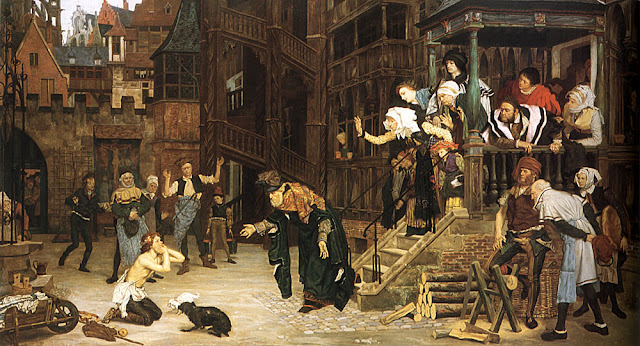Glory to the Father, and to the Son, and to the Holy Spirit. Open to me the doors of repentance, O Life-giver; for my soul goes early to the temple of Your holiness, coming in the temple of my body, wholly polluted. But because You are compassionate, purify me by the compassion of Your mercies.
Both now and ever, and unto ages of ages. Amen. Prepare for me the way of salvation, O Theotokos; for I have profaned myself with coarse sins, and consumed my whole life with procrastination. But by your intercessions purify me from all impurity.
Have mercy upon me, O God, according to Your loving-kindness: according unto the multitude of Your tender mercies blot out my transgressions. If I think upon the multitude of my evil deeds, I tremble for the terrible Day of Judgment. But trusting the compassion of Your mercy, I cry to You like David, Have mercy upon me, O God, according to Your Great Mercy.
The Lenten Troparia (verses) chanted after Psalm 50 during Matins
We have entered the period of the Lenten Triodion. The Lenten Triodion is the name of the book of hymns sung during Great Lent and the three weeks of pre-lent. It gets its name from three verses (tri-odes) that are chanted throughout Great Lent and pre-lent during matins. These verses are chanted immediately after Psalm 50 (51). They are a prayer inspired by King David's repentance.
The first verse is a prayer that repentance be granted. It acknowledges that repentance is a gift, a door that God opens for us. We come to the Temple of God's holiness in the temple of our sinful body. We present ourselves there and beg God's compassion. This is the beginning of repentance: pre-repentance, if you like. We cannot repent before we come to God, for repentance itself is a gift. We merely come. We come unworthy and beg. We beg that repentance be granted.
The second verse is a prayer to Mary, the Theotokos (God's Birthgiver). Here we beg her intercession, that she prepare the way of salvation. We acknowledge that we have profaned ourselves by what we have done (coarse sins) and by what we have left undone through procrastination. We have wasted our lives. Like the Prodigal Son, we have squandered through self-indulgence and inattention all that God has given us for the salvation of our souls. We pray that the Mother of Jesus, and by extension all of the Church, will intercede for us. And we believe that God through their intercessions will purify us.
The third verse begins by repeating the first line of Psalm 50 (51) and then reflects on my evil deeds in the light of the Day of Judgement. Fear and trembling result. "But." This "but" is all important. "But trusting in your mercy, I cry to You like David." On the one hand trembling. On the other hand trust in God's mercy. On the one hand judgement. On the other hand God's great compassion.
This is the tension of Great Lent. The Church invites us to embrace it, to feel the trembling and to cry out for mercy and to trust in God's compassion. Yes, we know the end of the story. We know that Christ is risen and that we do not come into judgment but have passed from death into life (John 5: 24). But we are like the Israelites of old. We ignore God when the pressure is off. We distract and titillate ourselves with passions. We allow ourselves to be tormented by fears and driven by anger. We forget the One who redeemed us, our Bridegroom, our Saviour, our God.
And the Church knows this. That is why the Church gives us Great Lent. The Church gives us the opportunity to persecute ourselves, to relive our salvation, to be saved again, to look closely at how slovenly and selfishly we have spent our life, the life given us by God to serve Him. The Church invites us to feel the fear and trembling of the Day of Judgement. The Church invites us to consider the foolish virgins who did not bring extra oil (works of mercy) and the foolish servant who buried his talent. The Church encourages us to see ourselves as the son who wasted his inheritance, yet was received back by his Father.
This is Great Lent

No comments:
Post a Comment